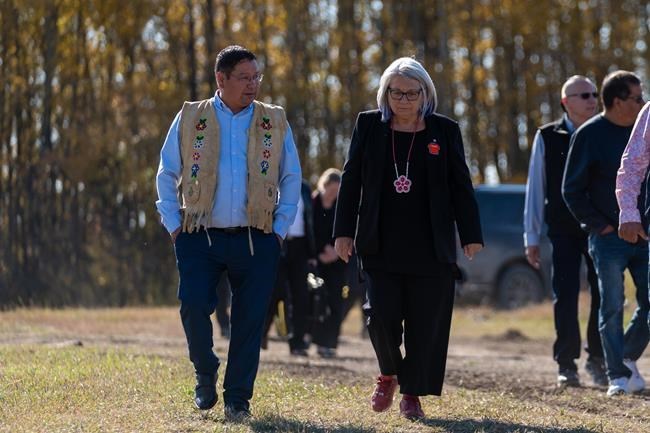JAMES SMITH CREE NATION, SASK. — Gov. Gen. Mary Simon placed tobacco Wednesday on the graves of some of the people who died in a stabbing rampage on the James Smith Cree Nation earlier this month.
She spent about an hour at St. Stephen's Church and cemetery, where most of the people who were killed from the community northeast of Saskatoon are buried.
"I just thought about the people that died because they were innocent people, and I really don't have words for it," said Simon, an Inuk leader who became the first Indigenous governor general in Canada.
"It's just a sense of loss people are feeling, and I can only imagine what they're going through. I'm not even a part of this community in an integral way and I'm feeling the heaviness and sadness."
A spokesperson from the governor general's office has said she was invited to the First Nation by Chief Wally Burns.
Ten people were killed on Sept. 4 and 18 others injured in the First Nation and a nearby village.
Simon, along with Burns and other local leaders, spent about two to three minutes at each grave, where the flowers were still fresh.
The governor general placed tobacco at each grave, starting with Gloria Lydia Burns. The pouch was placed next to other keepsakes family and friends left, including signs referring to her as "boss lady", religious candles and rocks inscribed with the sentiments "give, cherish, believe."
Simon ended at the grave of Gregory Burns, placing the tobacco near a teddy bear that said "All Lives Matter" and angel wings. Next to him is the grave of his mother Bonnie Burns, decorated with bingo dabbers, a pink cowboy hat and hearts.
Leaving the church grounds, Simon stopped for 10 minutes at a ditch where Earl Burns died in his school bus that rolled off the road after he was attacked. The retired military veteran was the community's school bus driver.
Simon then headed to the Bernard Constant Community School where students have now returned. The school had been closed since the stabbings in order to hold the funerals in the gym, which Chakastaypasin Band Chief Calvin Sanderson said highlights the need for a community healing lodge.
His band is one of three that coexist together on James Smith Cree Nation.
Inside, Simon met with the families of some of the victims while participating in a ceremony, dining on traditional fried fish and watching powwow dancers. She stood up to dance alongside Wally Burns.
"It made me realize talking face-to-face with some family members how difficult it is for them to deal with this trauma," Simon said. "You hear it on the news … but it's never quite the same when talking to people who have faced such a horrendous event."
First Nation leaders say many in the community knew the suspects, Damien and Myles Sanderson.
Both brothers are dead: Damien from non-self-inflicted wounds and Myles on Sept. 7 after going into medical distress while in RCMP custody.
"Everybody was impacted. We lost loved ones, our relatives," Calvin Sanderson said Wednesday.
"Members are still locking their doors and having their guns out and we have to assure them they are protected in our community with our own security."
Calvin Sanderson said Simon's visit was an honour, and he hopes the governor general will continue to help the First Nation. In addition to a healing lodge, he also called for a First Nation police service and housing.
Three homes, which were crime scenes following the attack, remain vacant despite being cleaned out.
Calvin Sanderson said some families don't want to return home after having their relatives killed and they now need a place to live.
Simon said she would take a message back with her to Ottawa.
"Today has been a very important day for me because I came here and I understand much more about what the community is going through," Simon said.
"So my message when I go back is: as much as we are supporting the community now, we will need to have ongoing support for the community over the long-term because this kind of trauma and grief doesn't go away easily."
This report by The Canadian Press was first published Sept. 28, 2022
Mickey Djuric, The Canadian Press




